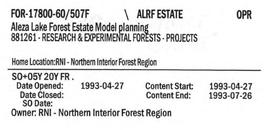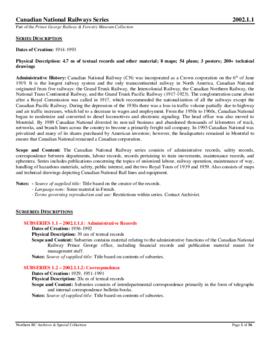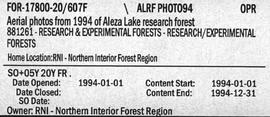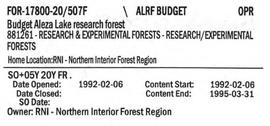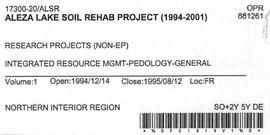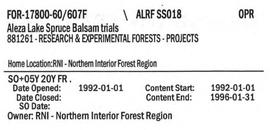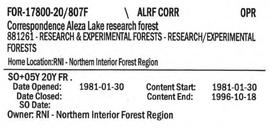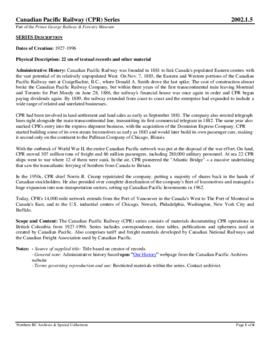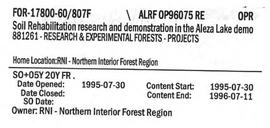File contains overview diagrams of Northwood cutting permits inside the Aleza Lake Research Forest, cutblocks showing harvesting and silvicultural history, detailed activity reports by cutblock, and 1992 Northwood cost summaries.
Item is "The Aleza Lake Experiment Station (1920's and 1930's)" by Ralph Schmidt and the British Columbia Forest Service.
File contains a trail guide, a report on potential trail building, and related maps.
File contains photocopied correspondence relating to climate monitoring stations.
File contains handwritten messages, photocopied invitations to a field tour, and related correspondence.
File contains correspondence regarding Estate Modelling plans for the Aleza Lake Research Forest and handwritten notes from meetings.
File consists of correspondence between Michael Jull, Research Silviculturist, and potential contractors, regarding proposals for the 1993 and 1994 remeasurement of Aleza Lake Growth and Yield Permanent Sample Plots.
Item is "Cluculz Lake Silviculture Demonstration Area Trail Guide" by the BC Ministry of Forests.
File consists of a speech given by Gary Runka entitled "The Importance of Agriculture to BC and the Creston Valley" Creston Valley Agricultural Society.
Commentary on this speech by Barry Smith of the Ministry of Agriculture and Lands:
"The speech begins with a number of recent urban newspaper headlines illustrating the level of awareness and the stress on agriculture.
The paper is broken into several major topics:
(I) The Options - in which two perspectives are outlined - one positive that agriculture has social value and is vitally important to the province and second, that agriculture is ultimately doomed.
(II) The Agricultural Land (Water) Base - 11 different land use planning issues are reviewed from an agricultural perspective. It is stressed that agriculture must become a more integrated part of the overall planning process.
(III) The Economic and Social Well Being of the Farming Community. It is noted that there are strong feelings in rural communities that government bureaucrats impose planning and resource management decisions on them rather than plan with or for them. Thus, if agriculture is to thrive it must, once again, become a more integrated part of the overall planning process and the agricultural land base must be assured.
(IV) The Ecological and Economic Sustainability of Agriculture - A key agricultural land conservation measure will be the redirection of regional and local urban growth to available and suitable lands outside the ALR. Provincial and local zoning is seen as a first step framework for managing competition for agricultural land.
Betterment Recapture - this (possibly Henry George inspired) comment reflects the need to recapture a portion of the appreciated value when agricultural land is converted to urban uses as a hedge against speculative forces.
The paper ends by encouraging farm areas like the Creston Valley to take pride in their agricultural community because the opportunity exists for a vibrant, healthy sustainable future."
File consists of a speech given by Gary Runka entitled "Agriculture in the Urban Shadow" at the Agricultural Land Commission Symposium - Urban Growth and the Agricultural Land Reserve: 'Up not Out' - March 9,1993.
Commentary on this speech by Barry Smith of the Ministry of Agriculture and Lands:
"This represents an important, highly pertinent speech concerning farmland preservation in B.C. The speech was given at the ALC Symposium marking the 20th anniversary of B.C.'s farmland preservation program. The speech rings as relevant today as it did when delivered 22 years ago.
It begins by identifying two perspectives - one, those committed to an agricultural future, contributing diversity and having a social value and two, those that feel agriculture is ultimately doomed and is only an interim use, especially in the urban shadow, until a "higher and better" use comes along. GGR states that we need to honestly state which perspective we are guided by.
There are a host of important themes woven through this paper including:
- While farming on the urban shadow benefits both the urban and farm communities, the negative impacts of urban/farm adjacency are predominantly borne by the agricultural community.
- In describing the situation prior to the farmland preservation legislation in the 1960's and early 1970's agriculture was consistently the "loser user".
- Even in the earliest days of the Commission, urban shadow issues were identified and the ALC recognized that provincial zoning was only a first step, and taken alone, was not enough.
- The BC farmland preservation program has been at least as successful as anywhere else in North American and looked on with envy in many other jurisdictions.
- GGR believes that after 20 years we are worse off today than when the program started due to (i) elected provincial politicians involved with the application process (ii) the ALR / Golf Course fiasco and (ill) the ALC has become paralyzed in their Appeal Board mode.
Several (13 starting on p. 7) urban shadow issues are outlined and GGR states that we must be serious about addressing urban shadow issues.
The paper ends with an outline of "where we need to be tomorrow" and GGR states: "I recall when the program began in 1973 we argued that all of the compromises with respect to agriculture had already been made, if we were to keep the options open for future
generations In British Columbia. If that statement was true then, how much more true is it today, 20 years later?"
From the Symposium concluding remarks, Gary Runka stated that based on his experience and discussions during the symposium, he believed that the following initiatives should be given priority:
- Information and education programs
- Communication between farmers, government and the public
- Regional land use planning
- Integration of government policies to a strong farmland preservation strategy
- Provincial agricultural strategy
- Programs which insure farms can be viable
The Symposium proceedings have been compiled in a 67 page ALC publication."
The Canadian National Railway series consists of administrative records, safety records, correspondence between departments, labour records, records pertaining to train movements, maintenance records, and ephemera. Includes publications concerning the topics of unionized labour, railway operation, maintenance of way, handling of hazardous materials, safety, public interest, and the two Royal Tours of 1939 and 1959. Also consists of maps and technical drawings depicting Canadian National Rail lines and equipment.
Canadian National RailwayItem is an original "The North Ridge Eco-Trail Guide: Aleza Lake Research Forest" booklet.
File contains trail guide brochures, a 1931 original copy of the Aleza Lake Experiment Station statement of its purpose and development, and other forest related brochures and books.
Item is a reproduction of a report entitled "Burns Bog Analysis" by Catherine Berris & Associates for the Ministry of Environment, Lands & Parks. The scope of this Burns Bog Analysis was inventory and preliminary analysis; the process included information collection and review, preliminary analysis of existing and potential land uses and a public open house.
Item is "The North Ridge Eco-Trail Guide: Aleza Lake Research Forest".
File consists of general correspondence concerning various administrative issues and the transfer of the Aleza Lake Experiment Station, newspaper articles, memoranda containing the general history of the Experiment Station, diagrams of timber sales, 1927 logging inspection reports, and an envelope containing biographical sketches of individuals involved in the early history of the Experiment Station.
File contains pre-harvest silviculture prescription reports and related correspondence between the Ministry of Forests, the Prince George Forest Region, and Northwood Pulp and Timber Limited.
File consists of chainsaw-cut stump data in selected plots for June and July 1993 and May 1994.
File contains colour aerial photography of the Aleza Lake Research Forest from 1994.
File consists of a speech given by Gary Runka entitled "Action Steps to Sustainable Agriculture" at the Forum on Sustainable Agriculture in Summerland.
Commentary on this speech by Barry Smith of the Ministry of Agriculture and Lands:
"This speech opens with a relatively broad discussion of sustainability- how defined - and how this relates to agriculture. "We've got to develop the ability to view farming in a conceptual sense, to view food production sustainability over the full horizon, including the urban world, as well as farm field."
The speech is broken into 3 sections with sub-sections:
(1) From a Practical Management Point of View. What Does "Sustainability" Mean on the Farm, Orchard or Ranch? Several points are made including the protection of land through the ALR. The principles of sustainability in, "Towards a Strategy for Sustainability" are listed.
(2) From the Food Producers Perspective, What are the Gaps in Practical Requirements to move Toward Sustainability? The points identified in the July 1994 workshop "Future of Agriculture in the Okanagan" are listed and noted as key points.
(3) With Land and Water Resources under Stress, What are the Action Steps to Regional Multicommodity Agricultural Sustainability? Under this topic seven sub-topics are explored:
a) sustainability and security of the land base with a particular emphasis on parcel size and the need for consolidation, land tenure, cost and speculation;
b) sustainability and water resources;
c) land use competition, compatibility, and planning process access - with an emphasis placed on the need for the farm community to have access to the planning process and a nod to the importance of Agricultural Advisory Committees. It is recognized that this will take an integrated effort of the ALC and Municipal Affairs;
d) vertically consistent policies and regulations from local to federal;
e) Right to Farm (with a plea to revisit the then current 'Agricultural Protection Act');
f) public education;
g) food policy; and
h) Socio-economic strategy for agriculture"
File contains requests for cutting authority and correspondence relating to logging between the Prince George Forest District and Northwood Pulp and Timber Limited.
This document is a photocopy of a 1994 draft report prepared by Scagel, Hickling, and Evans for BC Ministry of Forests, Silviculture Branch. The document includes annotations by Lorne Bedford, BC MoF (ret.).
File consists of a speech given by Gary Runka entitled "Landscape Level Planning - Fitting People into the Watershed" at the Stewarding Our Watersheds Conference.
Commentary on this speech by Barry Smith of the Ministry of Agriculture and Lands:
"The first half of this speech takes a very broad sweep in defining landscape units and the provincial planning system. In the second section "Entering the People Use Maze", the paper focuses more locally on the Salmon River watershed and discusses the findings of a survey associated with the Langley Rural Plan.
The survey results demonstrated that for both rural and non-rural residents in Langley, 'the country atmosphere' was why they had chosen to live in Langley. Residents also disagreed with the statement that it was unpleasant to live in an agriculture area.
The third section - "Techniques of Integrating Balanced, Sustainable People Use" into the Watershed" considers eight tools that will assist achieving "landscape level" planning, one of which is the ALC Act.
Besides these direct references to agriculture, country atmosphere and ALC Act; the Langley Rural Plan drew heavily on the survey that GGR refers to and the Plan, which was largely comprised of agricultural lands, was inspirational in the development of the Commission of work "Planning for Agriculture".
File contains ecosystem treatment data sheets from Northwood Pulp and Timber Limited.
File contains correspondence and diagrams regarding potential harvesting of spruce beetle killed trees from Northwood Pulp and Timber Limited.
File consists of budget proposals and forecasts for 1993/94 and 1994/95 with recommendations of road maintenance as the central expenditure.
File contains correspondence between Northwood Pulp and Timber Limited, the Prince George Forest Region, and the Aleza Lake Steering Committee regarding cut blocks to be harvested, particularly trees that have been infested by the spruce beetle.
File contains diagrams of areas to be salvaged in the Aleza lake Research Forest and pre-harvest silviculture prescription reports from Northwood Pulp and Timber Limited.
File contains climate data of soil and air temperatures, correspondence relating to climate studies, original and photocopied receipts for items related to the study, and computer generated graphs.
File consists of climate station data printed from computer disks, original and photocopied soil description forms, and original copies of ecological and terrain mapping reports.
File contains diagrams and maps of cutblocks from Northwood Pulp and Timber Limited.
File contains reports on soil rehabilitation project and related correspondence, photocopied tables of soil measurements, and photocopied pages of ledgers with diagrams and notes.
File contains charts consisting of the remeasurements of the basal area and cut stump data in permanent sample plots.
File contains handwritten journal lists of remeasured permanent sample plots and charts of remeasured permanent sample plots.
File consists of a speech given by Gary Runka entitled "Consensus Decision Making" for an Executive Development Program.
This born-digital document provides a description of the Topley LTSP site pedon.
File contains proposal updates and project expenditure lists.
File contains official government reports on tree types, correspondence regarding research proposals, and working plans.
File contains 1996 charts of permanent sample plot remeasurements.
File contains two different working and management plans for 1992 to 2002 as submitted by the Aleza Lake Steering Committee.
File contains correspondence relating to project funding and reports on the significance of the project.
File contains road reconstruction project reports, photocopies of invoices and work orders, records of daily costs, photocopies of hired equipment daily time reports, related correspondence, and maps.
File contains minutes of Aleza Steering Committee meetings, and correspondence regarding various administrative concerns, including budget proposals.
File contains general correspondence from 1981 through 1998 regarding various administrative issues including road maintenance and the 1992 reopening of the Aleza Lake Research Forest. The file also contains a 1994 inventory of the Northwood donation to the Fraser-Fort George Museum.
File contains drafts of management and working plan for the period of 1992 to 2002, the final draft for the management and working plan, and related correspondence between Mike Jull and those involved with the Aleza Lake Research Forest.
File consists of working copies of aerial photos, vegetation tables printed from computer disk, photocopies of plot sheets, and lists identifying species.
File consists of:
- "A Summary of Historical Orders-in-Council affecting the Aleza Lake Forest Reserve", Mike Jull, 18 Dec. 1996
- Photocopied memorandum from F.S. McKinnon regarding "Transfer of Aleza Lake to D.F. Prince George", 9 Sept. 1963
- Photocopied 1928 article by P.M. Barr from Forestry Chronicle 4(3) entitled "The Aleza Lake Experiment Station: Its Development and Purpose"
- "A Brief History of the Aleza Lake Experiment Station", [Tim Decie, 1981?]
- Contact information for living relatives of Percy Barr, as of 1990
- Photocopy of 1930 article by Percy Barr entitled "Spruce Reproduction in British Columbia"
- Photocopy of records from BC Archives from a visit by Harry Coates from the file GR 1348 "The Young Mens Forestry Training Program"
- Photocopy of excerpt regarding "Amanita Lake/Diameter Limit Logging"
- Various small-scale maps and charts regarding Aleza Lake
- "Aleza Lake Research Forest Information Session Notes with Mike Jull, Manager of ALRF"
The Canadian Pacific Railway (CPR) series consists of materials documenting CPR operations in British Columbia from 1927-1996. Series includes correspondence, time tables, publications and ephemera used or created by Canadian Pacific. Also comprises tariff and freight materials developed by Canadian National Railways and the Canadian Freight Association used by Canadian Pacific.
Canadian Pacific RailwayFile contains correspondence regarding funding for research project and computer generated maps.
